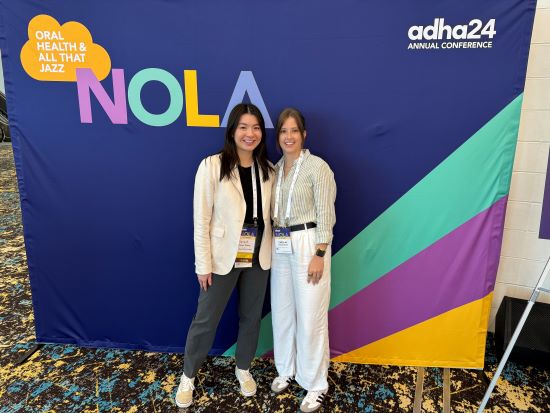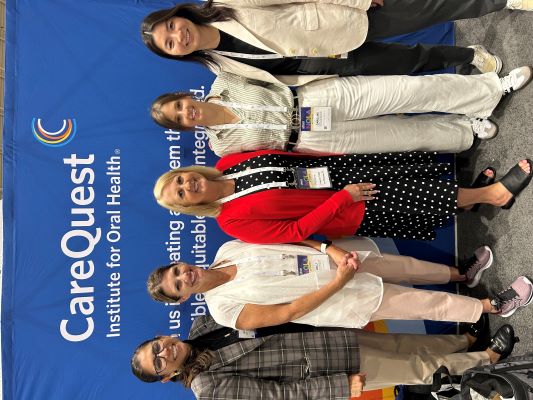Enter your email to receive the CareQuest newsletter:
August 1, 2024
By Caroline McLeod, MS, RDH, Value-Based Solutions Manager at CareQuest Institute

With their expertise in the mouth-body connection, clinical skills, evidence-based practice, and position to influence to address health equity, dental hygienists are a key part of the health care team.
Dental hygienists — and those topics — took center stage last week at adha24, the American Dental Hygienists’ Association’s annual conference in New Orleans, Louisiana, aka “NOLA.”
The conference, which was sponsored by several leading oral health organizations, including CareQuest Institute, explored topics that are shaping the future of the oral health industry and profession. What were the experts in preventing and managing oral disease discussing? These are four key themes that rose to the top during the event:
- Oral health is a core component of overall health.
Conference participants spent the weekend discussing how the health of the mouth and the health of the body are intertwined — for example, how severe caries during childhood is linked to poor nutrition, weight loss, and iron-deficiency anemia and how periodontal disease has been linked to adverse pregnancy and birth outcomes, cardiovascular disease, and diabetes — and the role dental hygienists play in caring for overall health. The conference spotlighted the link between mental and oral health through education about mental signs/symptoms and prevention/management strategies for dental hygienists and their patients.
We view our work through a lens of health equity.
Health equity took center stage throughout the conference. CareQuest Institute Health Sciences Specialist Hannah Cheung, MPH, MS, RDH; Clinical Content and Support Specialist Stephanie Clester, MA, RDH; and Program Evaluation Specialist Kelly Schroeder, RDH, MS, presented “What Does Equity Look Like in the Dental Setting?” discussing best practices to address health equity in the dental office. They explored the importance of comprehensive patient data collection, addressing social drivers of health, and practicing with cultural sensitivity.
CareQuest Institute team members at ADHA conference Additional applications of health equity during the conference in other sessions included education on oncology patients, caring for populations with special needs, and partnering with patients to determine care plans.
Another path to improving access and equity? Participants also discussed the potential of the Dentist and Dental Hygienist Compact that will soon allow dentists and dental hygienists to transport their license to states that have legally adopted the compact. (Check out our blog post on the compact!)
- Care must always be evidence based.
All health care providers must make care decisions with their patients based on the best available evidence and research, and that includes dental hygienists. We have the unique opportunity to make self-care recommendations, rooted in evidence of effectiveness, that support patients’ health goals.
A panel discussion on a recent International Federation of Dental Hygienists white paper highlighted how dental hygienists can provide personalized care through creating customized oral hygiene self-care recommendations. Attendees had the opportunity to further their knowledge on evidence-based recommendations by discussing provider and systems level impacts on patient oral health literacy with Hannah, Stephanie, and Kelly during their presentation, “Recognizing and Overcoming Barriers to Oral Health Literacy for the Dental Hygiene Patient.”
Technology is the present and future of health care.
As dental hygienists work with other health care providers and health disciplines, technology will facilitate comprehensive, coordinated care that can improve patients’ overall health. Attendees explored technologies such as artificial intelligence, teledentistry, diagnostic imaging tools, and electronic health records. They also engaged with a wide range of vendors in the exhibit hall to examine these technologies hands-on.The palpable excitement around improving patient care and advancing the profession coursed through the event. And it drives us at CareQuest Institute to continue to collaborate with dental hygienists to evolve the health care system to one where everyone can achieve excellent health.